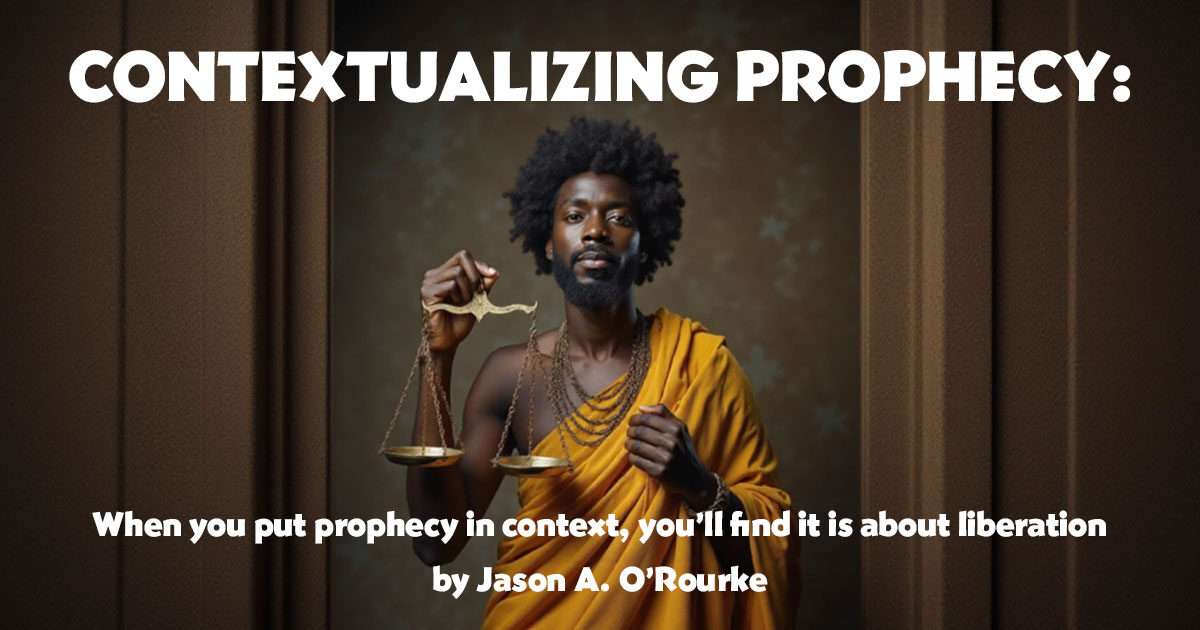What You Discover When You Read Prophecy in Context
by Dr. Jason A. O’Rourke, DMin | 22 July 2025 |
In every age, God raises voices—apostolic and prophetic—to give guidance of His people. In this essay, I offer theological reflections on the nature of prophecy, especially as it relates to the role of the conquered and the call of justice.
Apostleship vs. prophecy
The apostolic office proclaims the good news of liberation and the inauguration of a new covenant relationship with God through Christ. Apostles are sent to declare what is now available: a new covenant, a restored relationship, reconciliation, and the reign of God breaking into history.
The prophetic office, by contrast, functions within the context of an existing covenant and calls God’s people back to faithfulness, reminding them of their covenant obligations and warning of the consequences of obedience or rebellion.
The prophetic voice does not primarily predict the future, but reveals the moral truth of the present. Biblical prophecy is not primarily about forecasting events, but about exposing the relationship between a people and their God. It is, at its core, both forthtelling—speaking divine truth into the present—and foretelling—declaring the inevitable consequences of that truth if ignored.
In the Hebrew Scriptures, God never commands His prophets to initiate critiques against pagan rulers or foreign empires, even when those empires are deeply unjust. Here’s the pattern: the Hebrew prophets speak first and foremost to the sins of their own people. Even in the exceptional cases of Moses and Jonah—often cited as potential counterexamples—we do not find any denunciations of the specific sins of the oppressors. Moses speaks to Pharaoh only at God’s command and only about Israel’s release, not about Egypt’s moral decay (Exodus 3-10). Jonah, though sent to Nineveh, offers no detailed call for justice; he simply declares that destruction is imminent (Jonah 3:1-5).
Prophesy to your own!
This consistent prophetic orientation underscores a divine principle: God assigns His prophets to speak to their own. The prophetic voice is for internal reckoning. The Hebrew prophet rebukes Israel’s covenant unfaithfulness, calls for national repentance, and reminds the people of their unique responsibility before God. At times, prophets will speak about foreign nations (e.g., Amos 1-2), but when they do, it is almost always within the context of how those nations have treated God’s people—and God’s coming justice in response. Thus, their critique of the conqueror is not a prophetic outreach mission but a theological declaration of divine sovereignty and future vindication.
Moreover, when a conquered person does address their oppressor, it is only after being asked. This is no small matter. Prophets such as Daniel (chapters 2,4,5), Esther (4:15-16), and Nehemiah (2:1-2) only speak truth to power when invited into the space—and even then, they know that such truth-telling could cost them their lives. They do not initiate the conversation: they wait until summoned and questioned. And then, with great fear and trembling, they speak—not from a place of social capital, but from the authority of truth and divine commissioning.
This is because the conquered have no social capital to speak truth to the conqueror. They are seen not as truth-tellers but as complainers. Their critique is dismissed as weakness, their suffering as whining, their theology ridiculed as reactive, not revelatory. History reveals testimony of the oppressed is rarely heard by the powerful unless the powerful are shaken, humbled, or desperate. Until then, the voice of the oppressed is coded, symbolic, hidden in story and apocalyptic vision.
The prophetic strategy
The books of Daniel and Revelation exemplify this prophetic strategy.
Daniel chapters 2–7 are written in Aramaic—the language of the Babylonians—so that the message might be accessible to the empire. These chapters announce that the God of Israel is supreme over all kings and kingdoms. They forecast the fall of empires and declare divine judgment in favor of God’s saints.
However, chapters 1 and 8–12 are written in Hebrew, intended only for the covenant community. These Hebrew sections reassure God’s people that, although empires rage and beasts rise, God is moving history toward a moment of cosmic justification and purification. Daniel 7 tells the Babylonians that judgment is coming. Daniel 8 tells the Hebrews that the sanctuary—and by implication the holy people—will be cleansed and vindicated. The dual-language structure is not accidental; it is prophetic strategy.
Jesus, the prophet like Moses (Deut. 18), follows this same pattern. In Luke 4, he publicly declares his mission using Isaiah 61: “The Spirit of the Lord is upon me… to proclaim the acceptable year of the Lord.” He stops short of quoting the rest of the verse—“and the day of vengeance of our God” (Isaiah 61:2)—because he is not speaking to Rome. He is speaking to Jews. His sermon to them is about liberation, not vengeance. His message is about what God will do for the oppressed, not what God will do to the oppressor.
Judgment is coming for Rome, but that prophetic message is reserved for another time and audience. At this moment, Jesus is proclaiming the Jubilee gospel for his people. That is the essence of the apostolic gospel. Furthermore, that this declaration is documented by Luke informs us that this liberation is for all who align with the kingdom, regardless of ethnicity, gender, or class. Those who align themselves with the benefits and privileges of empire experience judgment.
Sabbath justice
That Jubilee framing matters. Jesus’ prophetic use of Isaiah 61 is not just spiritual—it is socially revolutionary. He apostolically announces a kingdom that fulfills the ethics of Jubilee: freedom for captives, sight for the blind, release for the oppressed. In doing so, he redefines the Sabbath not as a private religious ritual, but as a public declaration of divine justice and liberation. This redefinition explains why Jesus is repeatedly condemned for his Sabbath behavior. He heals, restores, liberates—all actions in keeping with the spirit of Jubilee.
And yet the religious leaders accuse him of breaking the Sabbath. Why? Because his actions threaten the status quo. The Sabbath ritual is always tolerated by the oppressor, and only becomes problematic when its liberative force clashes with empire’s systemic injustice. But Sabbath justice is intolerable!
Indeed, the fourth commandment—so often cited for Sabbath observance—includes a social vision that many overlook. “Your manservant, your maidservant,… the stranger within your gates” (Exodus 20:10) are all to rest. But in a kingdom shaped by Christ, no one should have manservants or maidservants! The stranger should not merely rest; they should be welcomed with justice and compassion. Furthermore, Leviticus teaches that Jubilee is to be declared on the Day of Atonement (Leviticus 25:9), connecting liberation to divine judgment.
Sabbath has dual meaning: it is an apostolic day of rest and renewal for the oppressed, and a prophetic day of judgment for those who benefit from oppression. This theological tension is at the heart of how Sabbath should be understood today.
Investigative judgment
This leads us to the question of judgment, particularly the Seventh-day Adventist doctrine of the investigative judgment. Too often, this teaching has been framed as a terrifying reckoning, a period of fear and trembling. And for those who built this theology—the socially dominant, the economically secure—perhaps such prophetic fear is appropriate. In Daniel 7:10, 22, 26, judgment is against the oppressor, for the oppressed.
But there has never been an apostolic interpretation of the investigative judgment written by those who suffer from systemic oppression. Such theology would likely cast 1844 not as a cosmic audit but as a divine declaration of liberation: in Daniel 8:14, it is the holy who shall be justified. It would read the judgment not as God scrutinizing the oppressed, but as God standing in defense of them.
This difference is not merely theoretical. It is borne out in early Adventist visionary experiences. William Foy, a Black man, received visions of judgment without mercy. His visions declared the urgency of justice and the certainty of divine reckoning.
Ellen White, a white woman, received similar visions—yet hers include Jesus pleading with the Father on behalf of the unsealed remnant (Early Writings, p. 38). In her vision, Christ intercedes four times. On the fourth, God sends a fifth angel to restrain the winds of destruction.
Why the difference? Foy spoke from the perspective of a people crying for justice. White spoke for a people in need of mercy. God gave them visions that fit their respective communal cries.
This reveals a deep truth about prophecy: it is contextual. The Spirit speaks to the real condition of a people. When the oppressed cry out, God sends prophets of justice. When the comfortable drift, God sends prophets of mercy. But in both cases, prophecy is truth-telling—forthtelling about where people stand with God, and foretelling what will happen if they remain unmoved.
Jesus: the full revelation of prophecy
To be a Christ-supremacist, then, is to recognize that Jesus is the full revelation of this prophetic mission. He is the Apostle, Prophet, Priest, and King. His words both comfort and confront. His life both liberates and judges. He does not simply offer future hope; he calls for present alignment. And in doing so, he centers the voices that empire silences, welcomes those empire excludes, and saves those empire crucifies.
Sabbath is not a private badge of piety; it is a public proclamation of Jubilee. Judgment is not a weapon of fear for the oppressed; it is a promise of vindication. Prophecy is not for religious entertainment; it is a divine summons to justice. And Christ is not merely supreme in worship; he is supreme over all systems—spiritual, social, and political.
In our time, we must recover this prophetic clarity. We must listen to the Daniels and Esthers among us—those who speak only when invited but speak with fire when they do. We must write our revelations in the language of empire when necessary, and in the sacred tongue of liberation for our people. And above all, we must let Christ reframe our theology, our rituals, and our resistance.
For in Christ, every Sabbath is a Jubilee. Every judgment is a promise. Every prophecy is a path to freedom.
 Dr. Jason O’Rourke DMin is a pastor, chaplain, educator, and military veteran. He enjoys taking “Adventure O’Rourke” trips with his wife and daughters.
Dr. Jason O’Rourke DMin is a pastor, chaplain, educator, and military veteran. He enjoys taking “Adventure O’Rourke” trips with his wife and daughters.




